Joint Mathematics Meetings 2024 Prize Spotlight
Congratulations to the following 2024 SIAM joint prize recipients and lecturers who will be recognized at Joint Mathematics Meetings (JMM) 2024 taking place on January 3-6, 2024, in San Francisco, CA.
- Maria Chudnovsky – AMS-MAA-SIAM Gerald and Judith Porter Public Lecture
- Ronald Coifman – AMS-SIAM George David Birkhoff Prize
- Natalie Dean – Joint Policy Board for Mathematics Communications Award
- Faye Jackson – AMS-MAA-SIAM Frank and Brennie Morgan Prize for Outstanding Research in Mathematics by an Undergraduate Student
- Kamuela Yong – MAA-SIAM-AMS Hrabowski-Gates-Tapia-McBay Lecture
Maria Chudnovsky
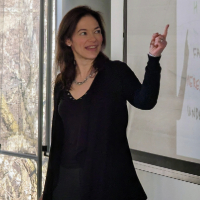
The Gerald and Judith Porter Public Lecture is given every year at the Joint Mathematics Meetings on a mathematical topic accessible to the broader community. The Porter Public Lecture series is offered jointly by the American Mathematical Society (AMS), the Mathematical Association of America (MAA), and SIAM. The Gerald and Judith Porter Public Lecture Series was established through the generosity and inspiration of Gerald and Judith Porter. Gerald Porter is Professor Emeritus of Mathematics at the University of Pennsylvania and has served the MAA as Treasurer, as a member of the Board of Governors for 22 years, and as a member and chair of numerous committees. Judith Porter is Professor Emerita of Sociology at Bryn Mawr College. Her research focuses on the relationship between AIDS and addiction.
Dr. Maria Chudnovsky, Princeton University, will deliver the 2024 Gerald and Judith Porter Public Lecture, titled “What Makes a Problem Hard,” at the JMM on Saturday, January 6 at 3:30 p.m.
Dr. Chudnovsky is a professor in the department of mathematics and in the Program in Applied & Computational Mathematics at Princeton University. She received her B.A. (1996) and M.Sc. (1999) degrees from Technion, Israel Institute of Technology, and an M.A. (2002) and a Ph.D. (2003) from Princeton. She was a research fellow at the Clay Mathematics Institute (2003–2008) prior to joining the faculty of Columbia University (2005-2014). Dr. Chudnovsky’s research interests lie in graph theory, in which she explores classifications and properties of graphs that can serve as shortcuts to brute-force methods.
Q: How do you feel your work has contributed to the advancement of the field, and what does this recognition mean for the broader community?
A: My work studies structural properties of natural classes of graphs. Once this foundation has been built, one can use it to answer questions and design algorithms. Often new important concepts and properties are revealed: after a certain behavior has been identified in one class, we can ask if it persists in more general settings and investigate its limits.
Ronald Coifman
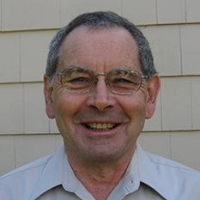
Established in 1967, the AMS-SIAM George David Birkhoff Prize honors George David Birkhoff (1884-1944), who served as the AMS President from 1925-1926. The prize is awarded every three years by SIAM and AMS for an outstanding contribution to applied mathematics.
The 2024 George David Birkhoff Prize in Applied Mathematics is awarded to Dr. Ronald Coifman of Yale University for “his profound impact on pure and applied harmonic analysis, and for the introduction of tools developed from these areas to address modern challenges of data science,” according to the citation. He will be recognized at the JMM Awards Celebration on Wednesday, January 3 at 4:45 p.m.
Dr. Coifman is Sterling Professor of mathematics and professor of electrical engineering at Yale University. He obtained his Ph.D. (1965) in Geneva under the direction of Jovan Karamata, and was simultaneously mentored by Guido Weiss, and later by Alberto Calderón and Antoni Zygmund, while an instructor in Chicago. He joined Weiss at Washington University in St. Louis (1968-1980) before he moved to Yale. Through the eighties he pursued an intensive collaboration with Yves Meyer and his team in Paris, later followed by broad collaborations in Israel with Amir Averbuch and his group. A current network joint with Ioannis Kevrekidis is developing mathematical empirical languages to enable modeling empirical observations.
Elected to the American Academy of Arts and Sciences in 1994 and to the National Academy of Sciences in 1998, SIAM member Dr. Coifman is a recipient of the 1996 DARPA Sustained Excellence Award, the 1996 Connecticut Science Medal, and the 1999 Pioneer Award of the International Congresses on Industrial and Applied Mathematics. In 1999, he was awarded the National Medal of Science and in 2018, the Rolf Schock Prize for Mathematics (Source).
Q: How do you feel your work has contributed to the advancement of the field, and what does this recognition mean for the broader community?
A: I am honored and thankful to AMS and SIAM, for the George David Birkhoff Prize. I was fortunate to have incredible mentors, collaborators, and students, with whom, over the years, the mathematical landscape of Harmonic Analysis/signal and transformation processing was expanded. Our goal was to extend classical analytical methods to apply generally beyond Euclidean spaces, and to be effectively implementable with efficient computations.
As a result, applied and computational Harmonic analysis is currently a broadly used array of tools and methodologies for signal processing and data analysis facilitating processing of biological genetic data, as well as brain activity, medical signal, etc. Our main goal is to recast mathematical challenges in appropriate structures, building mathematical languages to enable understanding of complex interactions in nature.
To quote mathematician/data scientist Fourier from his book on the analytic theory of heat, “Profound study of nature is the most fertile source of mathematical discoveries. Not only has this study, in offering a determinate object to investigation, the advantage of excluding vague questions and calculations without issue; it is besides a sure method of forming analysis itself, and of discovering the elements which it concerns us to know, and which natural science ought always to preserve: these are the fundamental elements which are reproduced in all natural effects.”
Natalie Dean
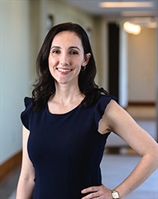
The Joint Policy Board for Mathematics (JPBM) Communication Award was established by the JPBM in 1988 and is given annually to reward and encourage communicators who, on a sustained basis, bring mathematical ideas and information to non-mathematical audiences. The JPBM is a collaborative effort of the AMS, ASA, MAA, and SIAM.
Dr. Natalie Dean will receive the 2024 JPBM Communications Award “for a remarkable record of public engagement providing clear meaning and context to COVID models and predictions through traditional and social media,” according to the award citation. She will present a lecture, titled "Tales from the Front Lines of Pandemic Communications," at JMM 2024 on Saturday, January 6 at 11:00 a.m.
Dr. Dean is an assistant professor in the department of biostatistics and bioinformatics at Emory University’s Rollins School of Public Health and codirector of the Emory Alliance for Vaccine Epidemiology. Her primary research area is in methods for infectious-disease epidemiology and vaccine study design. she received her Ph.D. in biostatistics from Harvard University and worked as a World Health Organization consultant and as faculty at the University of Florida. At the start of the COVID-19 pandemic, Dr. Dean became active in communications via Twitter and engagement with media. She has explained vaccine epidemiology to TV viewers, radio listeners, and newspaper readers in the U.S. and internationally.
Q: How do you feel your work has contributed to the advancement of the field, and what does this recognition mean for the broader community?
A: I'm proud of my work with public communications during the COVID-19 pandemic. It was an extraordinarily challenging time for society, and it was also a frantic time for infectious disease researchers. It was my honor to improve understanding of disease dynamics, modeling, and inference through my writing and interviews. I am so grateful for this recognition by JPBM, as well as for the support of my biostatistics colleagues, who let me know they were proud to see a “biostatistician” out front. Our field has incredibly valuable skills to contribute to large and thorny problems in public health, and we must claim our seat at the table and stay visible. I hope that we can inspire a new generation of scientists to take a leading role in using analytical skills to advance health and well-being.
Faye Jackson
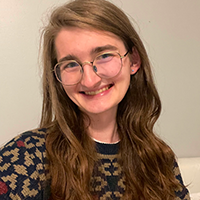
The Frank and Brennie Morgan Prize for Outstanding Research in Mathematics by an Undergraduate Student is awarded every year jointly by AMS, MAA, and SIAM to an undergraduate student or to undergraduate students who have submitted joint work.
Faye Jackson will receive the 2024 Frank and Brennie Morgan Prize for her work as a mathematics major at the University of Michigan. According to the prize citation, Jackson worked on a wide range of topics in combinatorics and number theory. In particular, she discovered and theoretically explained several new and unexpected phenomena in analytic number theory. She will be recognized at the JMM Awards Celebration on Wednesday, January 3 at 4:45 p.m.
Jackson is a math Ph.D. student at the University of Chicago and a former undergraduate at the University of Michigan. She strives to become an educator for equity and to discover beautiful phenomena in mathematics. She has coauthored eight research papers, four of which have already been published or accepted in journals such as Journal of Number Theory, Discrete and Computational Geometry, and The Fibonacci Quarterly.
Additionally, she has worked as a mentor and instructor for the Ypsilanti Math Corps in Ann Arbor and has helped run a Polymath Jr. research group that provides research opportunities to many students. Jackson also received a Goldwater Scholarship in 2022 and the Alice T. Schafer Prize from the Association for Women in Mathematics in 2023 (Source).
Q: How do you feel your work has contributed to the advancement of the field, and what does this recognition mean for the broader community?
A: My work follows some of the broad themes of number theory over the past century. In essence, we are often presented with interesting combinatorial and/or number theoretic problems of intrinsic interest. Analytic number theory, for example the circle method, is able to yield illuminating asymptotics about relevant quantities, but these asymptotics are still quite difficult to understand. Thankfully, algebraic number theory as well as the theory of L-functions can be brought to bear against these terms, greatly enhancing our understanding of them. On the other hand, there are still so many unanswered questions about these basic objects and problems which seem intractable with modern methods. The data clearly shows something amazing going on, and we are left to marvel at how to prove it. I think the recognition of my work shows both how far we've come as well as how far we have yet to go.
Kamuela Yong
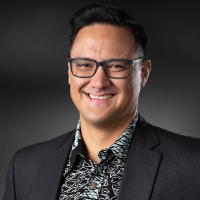
The Hrabowski-Gates-Tapia-McBay (HGTM) Lecture is named after four influential scientists of color: Freeman Hrabowski, President of the University of Maryland at Baltimore County; S. James Gates Jr., University of Maryland, College Park and Brown University; Richard Tapia, Rice University; and Shirley McBay, Founder and former President of Quality Education for Women and members of traditionally underrepresented groups. Through multiple mechanisms, these sessions expect to facilitate and accelerate the participation of scientists in the building of sustainable communities of mathematicians and mathematical scientists. In particular, the intention is to systematically recruit, welcome, encourage, mentor, and support individuals from underrepresented groups in the U.S.
Dr. Kamuela Yong will deliver the HGTM Lecture, titled “When Mathematicians Don’t Count,” at JMM 2024 on Friday, January 5 at 9 a.m.
Dr. Yong is an associate professor of mathematics at the University of Hawai‘i, West Oʻahu and co-founder of Indigenous Mathematicians. He is the first Native Hawaiian to earn a Ph.D. in applied mathematics. Originally from Waimanalo, Hawai‘i, Dr. Yong went to Los Angeles where he earned a B.S. in civil engineering and applied mathematics from Loyola Marymount University (2007). He then went to the University of Iowa where he earned a M.S. in mathematics (2009) and his Ph.D. After Iowa, Dr. Yong did a postdoctoral fellowship at Arizona State University before joining the University of Hawai‘i faculty.
His research interests include mathematical modeling of biological, ecological, and epidemiological systems using diffusion. Dr. Yong is the 2019 recipient of the Frances Davis Award for Excellence in Undergraduate Teaching and the 2020 recipient of the University of Hawai‘i Regents’ Medal for Excellence in Teaching.
Q: How do you feel your work has contributed to the advancement of the field, and what does this recognition mean for the broader community?
A: By establishing a community and supportive network for Indigenous mathematicians, we not only provide crucial encouragement for those already in the field but also inspire and attract new talents. The HGTM Lecture serves as an excellent platform to amplify the visibility of Indigenous mathematicians, building connections with those who can benefit from our community. It also stands as inspiration for individuals still seeking their own supportive network within the broader mathematical community.
Stay Up-to-Date with Email Alerts
Sign up for our monthly newsletter and emails about other topics of your choosing.



